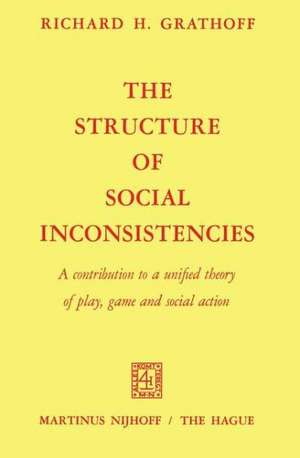The Structure of Social Inconsistencies: A contribution to a unified theory of play, game, and social action
Autor R. Grathoffen Limba Engleză Paperback – 31 iul 1970
Preț: 379.76 lei
Nou
Puncte Express: 570
Preț estimativ în valută:
72.70€ • 74.93$ • 61.30£
72.70€ • 74.93$ • 61.30£
Carte tipărită la comandă
Livrare economică 27 februarie-13 martie
Preluare comenzi: 021 569.72.76
Specificații
ISBN-13: 9789024750061
ISBN-10: 9024750067
Pagini: 200
Ilustrații: VIII, 186 p.
Dimensiuni: 155 x 235 x 11 mm
Greutate: 0.29 kg
Ediția:Softcover reprint of the original 1st ed. 1970
Editura: SPRINGER NETHERLANDS
Colecția Springer
Locul publicării:Dordrecht, Netherlands
ISBN-10: 9024750067
Pagini: 200
Ilustrații: VIII, 186 p.
Dimensiuni: 155 x 235 x 11 mm
Greutate: 0.29 kg
Ediția:Softcover reprint of the original 1st ed. 1970
Editura: SPRINGER NETHERLANDS
Colecția Springer
Locul publicării:Dordrecht, Netherlands
Public țintă
ResearchCuprins
I. Introduction: Social Action and Play.- 1.1 Sociological Interest in Game and Play.- 1.2 Contextual Inconsistencies and the Marginality of Games and Play.- 1.3 Some Studies of Contextual Inconsistencies.- 1.4 The Topic and its Methodological Frame.- 2. Consistency in Social Interaction.- 3. Some Phenomenological and Pragmatistic Theories of Relevance.- 3.1 Schütz’ Theory of Relevance.- 3.11 Thematic Relevance.- 3.12 Motivational Relevance.- 3.13 Interpretational Relevance.- 3.2 Gurwitsch’ Theory of Relevance.- 3.3 James’ Theory of Fringes and Peirce’ Abductive Reasoning.- 3.31 The First Stage of Inquiry: Abduction, which is Related to the Emergence of Incipient Events.- 3.32 The Second Stage: Deduction, which is Related to Typification.- 3.33 The Third Stage: Induction, which is Related to the Formation of Types.- 3.34 Summary.- 4. Social Inconsistencies and Social Types.- 4.1 The Structure of Social Relevance.- 4.2 The Rôle of Play in Processes of Typification.- 4.3 The Notion of Typificatory Scheme.- 4.4 Gaps and Social Inconsistencies.- 4.41 Permanent Gaps.- 4.42 Definition of Social Inconsistencies.- 4.5 The Arisal of Social Types.- 4.51 The First Stage: Arisal of an Incipient Event.- 4.52 The Second Stage: Typification by the Incipient Event.- 4.53 The Third Stage: Type and Social Object.- 4.6 Conclusion.- 5. Temporal Typification and Social Temporality.- 5.1 Typificatory Schemes and Social Temporality.- 5.11 Temporal Typification and Inner Time.- 5.12 A Necessary Condition for Social Temporality.- 5.13 Schütz’ Notion of “Vivid Present” and Social Temporality.- 5.14 Parsons’ “Pattern Variables” and Social Temporality.- 5.2 Social Temporality and Incipient Events.- 5.21 Social Inconsistencies in Parsons’ Frame of Pattern Variables.- 5.22Incipient Events in Schütz’ Notion of We-Relation.- 5.23 A More Stringent Condition for Social Temporality.- 5.3 G. H. Mead’s Notion of the Present and Social Temporality.- 5.4 A Comparison with Some Notions of Sartre.- 5.5 Summary.- 6. Social Inconsistencies and Symbolic Types in Play.- 6.1 Reduction of Types in Play and Social Action.- 6.11 A First Characteristic of Play: Reduction of Types in Play.- 6.12 Reduction of Types as “Entlastung” in Social Action.- 6.2 Social Limits and Symbolic Types in Play.- 6.21 Anomie, Social Relevance, and Symbolic Types.- 6.22 The Symbolic Type of the Fool.- 6.23 Social Limits: Anomie and Alienation.- 6.24 Play and Symbolic Types (Second Characteristic of Play).- 6.25 Summary: The Nomic Rôle of Play.- 6.3 The Rôle of the Body in Play.- 6.31 The Body as Incipient Event.- 6.32 The Body in Play (Third Characteristic of Play).- 7. Toward a Unified Theory of Game, Play, and Social Action.- 7.1 Common Symbolic Types in Play and Game.- 7.2 Inconsistencies and Relevance in Play, in Game, and in Social Action.- 7.3 The Closure of a Game’s Typificatory Scheme.- 7.4 Conclusion: Game and Social Action.- 8. Team and Audience.- 8.1 Team and Audience: Theory.- 8.2 Practice: The Relation between Career Patterns and the Structure of Games.- 9. Conclusion: The Construction and Solution of Social Inconsistencies.















